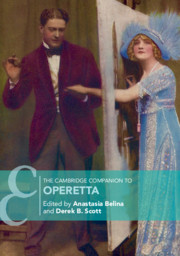Book contents
- The Cambridge Companion to Operetta
- Cambridge Companions to Music
- The Cambridge Companion to Operetta
- Copyright page
- Contents
- Illustrations
- Tables
- Music Examples
- Notes on Contributors
- Chronology, 1855–1950
- Introduction
- Part I Early Centres of Operetta
- Part II The Global Expansion of Operetta
- 6 Going Global: The International Spread of Viennese Silver-Age Operetta
- 7 Spain and Zarzuela
- 8 Camping along the American Operetta Divide (on the Road to the Musical Play)
- 9 Operetta in Russia and the USSR
- 10 Operetta in the Nordic Countries (1850–1970)
- 11 Operetta in Greece
- Part III Operetta since 1900
- Select Bibliography
- Index
- References
9 - Operetta in Russia and the USSR
from Part II - The Global Expansion of Operetta
Published online by Cambridge University Press: 14 November 2019
- The Cambridge Companion to Operetta
- Cambridge Companions to Music
- The Cambridge Companion to Operetta
- Copyright page
- Contents
- Illustrations
- Tables
- Music Examples
- Notes on Contributors
- Chronology, 1855–1950
- Introduction
- Part I Early Centres of Operetta
- Part II The Global Expansion of Operetta
- 6 Going Global: The International Spread of Viennese Silver-Age Operetta
- 7 Spain and Zarzuela
- 8 Camping along the American Operetta Divide (on the Road to the Musical Play)
- 9 Operetta in Russia and the USSR
- 10 Operetta in the Nordic Countries (1850–1970)
- 11 Operetta in Greece
- Part III Operetta since 1900
- Select Bibliography
- Index
- References
Summary
This chapter offers a brief overview of the history of operetta in Russia, starting with performances and reception of German and French operettas from the eighteenth to the twentieth century, and exploring home-grown, Soviet operetta. It will show that operetta was big business in tsarist Russia, and later in the Soviet Union, and demonstrate that it was a valuable resource, a laughter therapy, for the Soviet authorities with which to anaesthetize the masses to the realities of life. The works by German and French composers dominated Russian operetta stages, with the most popular composers being Suppé, Offenbach, Planquette, Hervé and Lecocq, until Soviet composers began to create operettas according to the new, official socialist realism style. This chapter will briefly introduce significant operetta composers – Dunayevsky, Strelnikov, Aleksandrov and Milyutin – and discuss contributions to the genre from such well-known composers as Shostakovich and Kabalevsky. It also gives a brief account of how operetta was instrumental to boosting the morale of the population ravaged by World War II, especially in blockaded Leningrad, and shows that operetta (both European and Soviet) is still popular in today’s Russia.
- Type
- Chapter
- Information
- The Cambridge Companion to Operetta , pp. 135 - 148Publisher: Cambridge University PressPrint publication year: 2019

